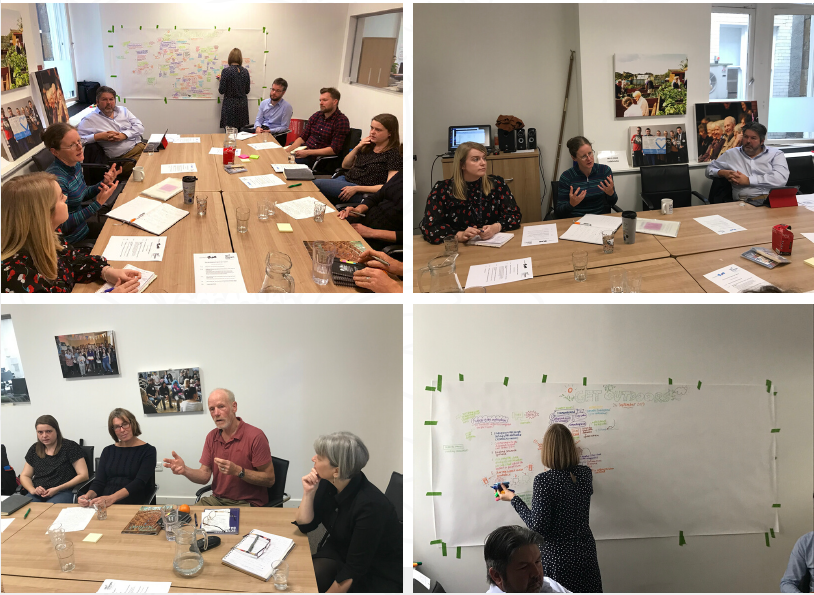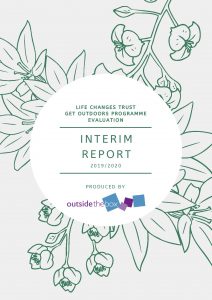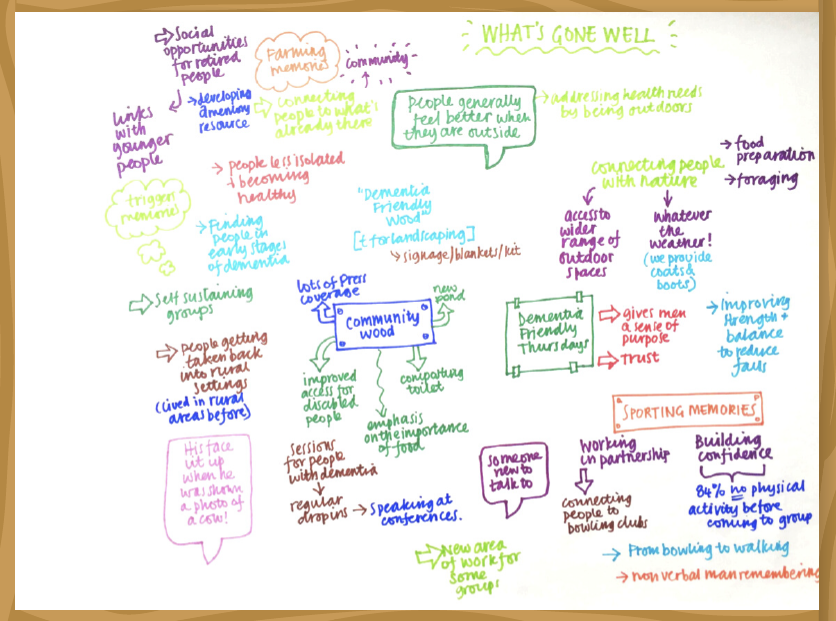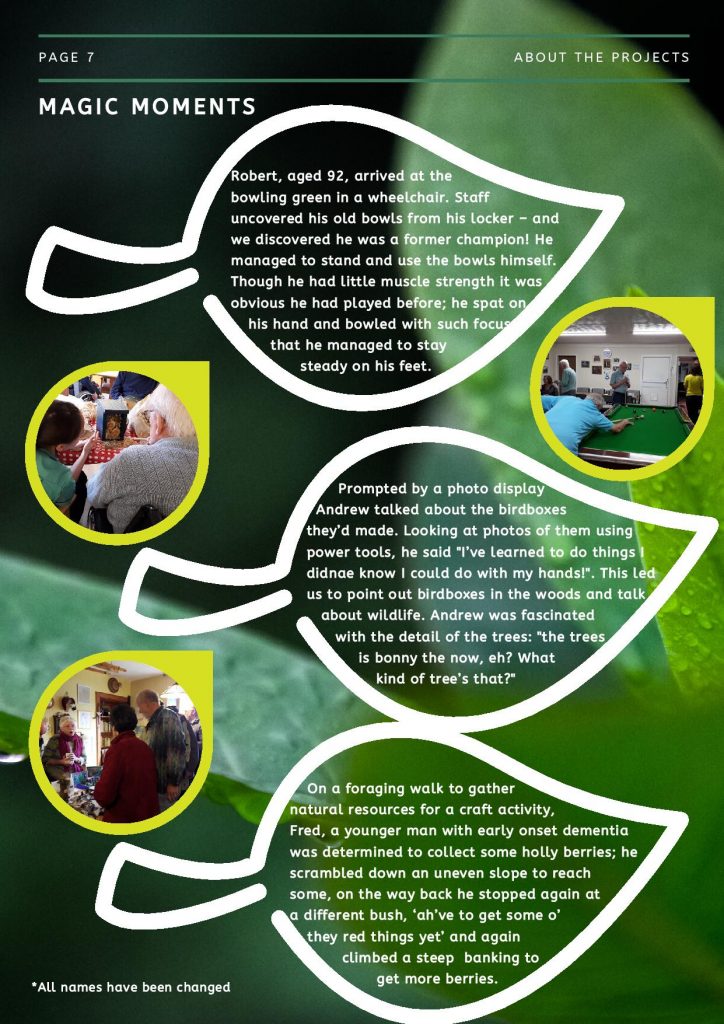In 2019, Outside The Box was asked by the Life Changes Trust to carry out an evaluation of their Scotland-wide Get Outdoors project, which provided funding of up to £15,000 to six projects that support people living with dementia and their carers to ‘get outdoors’ in different ways through a wide range of different activities.
After visiting several of the projects, speaking to people living with dementia, their carers, staff and volunteers we have started to see some emerging key themes, which we have laid out in this interim report.
You can download a PDF version of it here.
Introduction
Outside the Box were appointed in July 2019 to carry out an independent evaluation of the Get Outdoors projects which encourage people living with dementia to have opportunities, and to enjoy the benefits of spending time outside.
The aim of the evaluation is to assess and explain to what extent:
- Outdoor activities are creating better lives for people living with dementia and for their unpaid carers
- What has not worked and why
- Any barriers and challenges the projects have faced
- The projects can provide short, medium and long-term post-diagnostic support for people with dementia
- Partnership working and any significant benefits this partnership working brings
- The likelihood that these initiatives will be sustained in the long term
- Contributions to deeper learning about the benefits of getting outdoors for people with dementia and how this learning can be shared more widely.
This interim report will cover the following
- What we have done at this stage
- Background about the projects
- Key themes
- Main challenges
- Key successes
- Unexpected outcomes
- Next Steps for the evaluation
What we have done
We had originally planned to carry out workshop sessions with people and carers attending activities with the Get Outdoors projects. However, after the first visit to Sporting Memories at the Wishaw Bowling Club it became very clear that this approach would take people away from what they enjoyed doing and bring them inside.
Instead we have adopted ethnographic approaches that allowed us to visit, observe and participate in the activities, see people’s reactions and responses, and get to know people through conversation. Once we had built up a relationship with people, we were then able to have some longer conversations using unstructured interview techniques which we recorded using audio or video or taking notes.
In preparation for the conversations we developed key topic themes based on the Get Outdoors programme outcomes and the outcomes from the individual projects. We used this approach for people living with dementia, their unpaid carers, family members and volunteers.
To record and examine the conversations we have developed a ‘magic moments’ feedback tool that records key stories, quotes and experiences and identifies themes. We used ‘magic moments’ and quotes from the conversations throughout this report.
For project staff and volunteers and staff from partner organisations we developed a set of questions based upon the Get Outdoors programme outcomes. We conducted structured interviews and asked these questions in one to one conversations, with groups of stakeholders and via email.
Since July we have visited
- Sporting Memories at Wishaw Bowling Club
- Froglife at Erskine Care Home and Alzheimer’s Scotland in Bridgeton
- Instinctively Wild at the Haining House in Selkirk
- NHS Dumfries and Galloway
- Evanton Wood
We have arranged to visit the Ecology Centre in the Spring and will also be returning to NHS Dumfries and Galloway later next year.
In September we facilitated a learning and sharing event in Glasgow. Five of the projects were able to attend and participate. The projects shared their highlights, success and challenges. These are covered in more detail later in the paper. A clear benefit for the projects was the opportunity to share their experiences and discover that most of the projects had similar experiences and faced the same issues. 
About the projects
There are six projects funded via the Get Outdoors programme funding. So far we have conducted full visits to four of these, had an initial meeting with Dumfries and Galloway and have made arrangements to visit Dumfries and Galloway and the Ecology Centre next year. Below is a brief summary of projects.
The Sporting Memories project centred around Wishaw Bowling Club. Sporting Memories aims to unite older people, demographically mainly men, who used to enjoy sport to come together and share memories and photos. The sessions include some gentle sporting activity. In Wishaw the project was coordinated by two Sporting Memories staff, with members and volunteers from the Bowling Club. Around 8 people living with dementia with family carers or care home staff came along to regular sessions. They played bowls with an important social element of tea and biscuits to follow.
The Froglife project adapted the aims and ethos of Froglife (amphibian conservation) to a care home setting, with the emphasis on creating nature-based activities which could take place indoors or outdoors. The sessions ran from May to September in a range of locations including two care homes, support sessions for people living with dementia run by Alzheimer’s Scotland and Glasgow’s Golden Generation. The sessions were developed and run by Louise Smith, the Development Worker for Froglife. They tended to be small sessions of 4 or 5 people living with dementia and staff from the care homes or from Alzheimer’s Scotland.
Evanton Community Wood, the first dementia-friendly woodland in Scotland, ran a project which consisted of sessions in the community woodland, with around 10 people living with dementia plus family carers, volunteers and some care home staff. They took part in nature-based craft and making activities, cooking and sewing in a custom-built shelter.
Instinctively Wild ran two blocks of ‘eco-therapy’ sessions, using nature connection activities, indoors and outdoors. Around 9 people living with dementia plus volunteers/carers participated at each session. As well as natural craft activities, and refreshments, music also played an important role here.
NHS Dumfries and Galloway are working with people living with dementia in local care homes to develop memory boxes around outdoor activities and experiences. They are also working with local farms to develop visits and experiences for people living with dementia. The first visit was in October and more are planned for next year.
Ecology Centre – the Ecology Centre in Fife has not had a visit from us yet, however we heard from them at the learning event in Glasgow. The project offers dementia-friendly activities around gardening, birdwatching and ‘men’s shed’ activities, as well as cooking.
From the projects visited so far, here are a few ‘Magic Moments’:
Themes
As we have progressed with our evaluations, including the learning event in Glasgow, some key common themes have emerged. Some of these were anticipated, some more unexpected. Here are the themes that stand out most so far; we anticipate yet more will become apparent as we continue with the evaluation.
Challenging assumptions and stigma - for many of the people involved in the projects, there was a preconceived idea about what dementia looked like. Although some of those involved were experienced professionals, others were experts in the setting only (bowling, woodland management, amphibians and wildlife) and did not necessarily have any experience with people living with dementia.
At least one leader told us he had been apprehensive about this unknown ‘client group’ but that after 2-3 weeks he had a new understanding of dementia and that people were still very much individuals, with unique personalities like anyone else.
We also witnessed care professionals who assumed their clients were physically unable being surprised at the capacity of people in terms of simply standing up, their manual dexterity or their strength.
A sub-theme of this has been seeing the benefit of allowing people to take risks, and to assess risks for themselves. Simple things like touching a nettle or walking without a stick were tried and achieved, giving the individuals a new sense of self-esteem and surprising the carers or professionals involved.
‘I can do things with my hands I didn’t think I could do!’
Improved confidence and wellbeing – Especially where people have been given the chance to undertake physical activity they would not normally do. We have also observed the benefits to people for simply getting outside, into the elements, where they can admire nature close at hand or take in a scenic view. Even in industrial Wishaw, family carers spoke of their enjoyment of the tranquility and sense of calm of stepping into a green space (the bowling green) ‘like a secret garden’.
Being part of a group and community – at all the projects we have observed a strong sense of community, with friendships made within the group sometimes being carried on outwith the sessions. People got together to help each other with things like car sharing and everyone supported one another. Where previously people had been quite isolated, including family carers, they have found new social connections and meaning to their week.
‘He used to sit inside the care home all day, every day…this has done him so much good…they do their best in the care home but there’s nothing happening…he loves coming to these sessions.’
Impact on carers - unpaid family carers have clearly benefited from the work of the projects. For a start they are offered a choice about what they would like to do. Some carers stay at home or go somewhere else so they have a break from their caring responsibilities. Many of the family carers enjoyed participating in the group, as it was an opportunity to meet people, socialise and share experiences with other family carers.
Her husband is now too ill to come along to the sessions, but she will keep coming as she loves having the chance to learn new crafts and to meet other people, the new friends she has made. She would never have the chance to get her paints out at home, and she loves having the chance to cook and eat with the group.
Lasting Impact – in different ways, the projects have left a legacy which means their effects will continue beyond the projects themselves. In the case of Evanton Wood, people have agreed they will continue to meet over the winter and support each other to get there. They have also obtained further funding to run a new project involving school pupils. In Wishaw, volunteers have organised wintertime sessions of darts and dominoes in a local pub. Several of the projects have found ways of recording their activities so that participants can take away lasting, meaningful mementoes such as logbooks (Evanton, Instinctively Wild), ‘memory blankets’ (Evanton)) which will prompt memories and discussion around what was done at the sessions and more distant events from the participants’ lives.
Main Challenges
Scottish weather
All the projects have found the weather challenging. The approach Evanton, Instinctively Wild, and Sporting Memories took to overcome the weather was to split the activities between indoors and outdoors and by managing the activities by getting outside when they could and then coming back inside. Evanton had also had extra funding to buy some cosy, waterproof blankets which meant that people could sit outside on the veranda and watch the weather. Froglife encouraged people outside as often as possible but also took the approach of bringing the outside in. For example, by decorating and planting up flowerpots and then returning them to the garden.
On visiting some projects we noticed that some people coming from care homes did not always have such warm, waterproof shoes and clothes.
Participant recruitment
For some projects, there was a challenge encountered regarding initial ‘recruitment’ of participants – this varied depending on the methods involved, for example some projects from the outset were linked in with professionals, for example Instinctively Wild had referrals from Occupational Therapists. The Ecology Centre offered open days or taster sessions before people had to commit.
Different stages of dementia
Working with and managing a group of people of different ages, abilities and physical health was a challenge for most projects. Most projects had extra volunteers to help with individuals who needed one to one support. Working in a care setting with people living with more advanced dementia Froglife worked with small groups of people supported by care staff.
Occasionally there were people for whom the sessions were not suitable, either because they were in very early stages and were overwhelmed when they found themselves in a setting with people with more advanced dementia. Or with people at more advanced stages when they no longer enjoyed the change to their routine and the activities, and became being restless and distracted.
Key Successes
Most of the successes were shared at the learning event in Glasgow, and also witnessed at some of the sessions we have observed. Based on the project objectives, these include:
Reduction in loneliness
“We have created social occasions and activities for everyone to join in with, people living with dementia, family carers and volunteers.”
Everyone involved, not just the people with dementia but also their family carers, gained from the social connections made at the groups.
Increased physical activity and improved physical and mental well-being
“We have seen such competitive spirit and fun – it’s quite contagious and a pleasure to be part of it”
“Helping people get physically active again, sometimes without realising it, because it’s a key part of the activity and the fun”
Family and paid carers, volunteers and healthcare professionals have all been impressed and surprised to see how much the sessions have helped people to engage, be active, rediscover old skills or learn new ones, and have a laugh sharing meaningful activities with others.
At the Wishaw Bowling sessions we observed very frail elderly man living with dementia teach the rest of the group how to bowl.We saw how the sessions can act as a tool to help stimulate or prompt old memories.
Betty attends the sessions with her husband Bob. She is a former English teacher and he is a writer. When they were out on the walk, a rose bush sparked a memory of a poem that she used to recite. Talking about it around the fire later, Bob was able to get her to recite it again by prompting the first word.
Increased confidence and participation in community
“People feeling useful and part of things by making bird feeders and mini ponds for wildlife”
“It’s been good to see people learning new skills and refreshing old ones”
“Seeing people make new friends and rediscover old ones and everyone supporting and encouraging each other”
People have made new friends, sometimes based on common interests, or being similar ages. At the bowling we heard how one son now hears about new friends his dad has met – the older man has a new-found independence and freedom, without being supervised constantly by his son.
Unexpected outcomes
So far the evaluation has thrown up a few ‘unexpected’ outcomes. These include:
- Wishaw bowling club – aiming to be the first dementia friendly bowling club
- Evanton attracting further funding for an intergenerational project, building on the success of its pilot project.
- Other related groups becoming more willing to go outdoors – the example of one group has caused a ripple effect, people have seen that the risk assessments and logistics are not insurmountable and that the benefits could outweigh the risks.
- Family carers becoming volunteers and taking up regular bowling themselves.
- One family carer setting up a dementia-friendly café
- ‘Finding things to talk about’ – being in nature lends itself to ‘mindfulness’ and ‘living in the moment’ – there is so much to observe and talk about that it promotes different conversations and memories
- The power of music to connect and stimulate old musical skills – and as a communication method.
- Stronger bond formed between parent and child – child becoming the ‘hands’ to help parent create artwork.
Next steps
Our plans for the next few months include:
- Visits and assessments with NHS Dumfries and Galloway and the Ecology Centre.
- Complete individual assessments and data analysis for Evanton Wood, Instinctively Wild, Froglife and Sporting Memories, including written/telephone feedback from stakeholders.
In January we will begin to share stories and findings from the evaluation including
- Blogs from our visits to Froglife, Evanton Wood and Instinctively Wild
- Short thematic videos produced from interviews we carried out with group attendees, project staff and stakeholders
- Showcase key themes around impact and difference in peoples lives
- Magic Moments from conversations and activities
Read more
Bowled Over – How ‘getting outdoors’ can help people living with dementia
Evanton Wood – Scotland’s first ‘dementia-friendly woodland’



